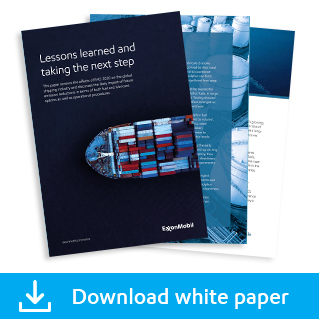
Lessons learned and taking the next step: moving to a lower carbon future
The success of IMO 2020 conclusively shows what the marine industry can achieve when it coordinates its response to far-reaching change; despite the many challenges, the switchover was primarily plain sailing.
This ability to adapt will be tested again by the IMO’s ambition to reduce the carbon intensity of international shipping by at least 40% by 2030, moving to 70% by 2050, compared with 2008.
How these targets could be met, including the role of new fuel and lubricant formulations, is explored in a new ExxonMobil technical paper, ‘Lessons learned and the taking the next step’. It includes contributions from leading stakeholders from across the maritime sector including Christos Chryssakis, senior researcher, DNV, Ashley Jenkins, director, John H Whitaker (Tankers), Lars Malmbratt, general manager marine fuels, Stena Bulk, and Maximilian Rothkopf, chief operating officer, Hapag-Lloyd.
